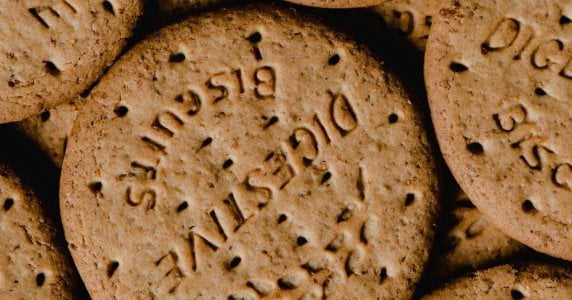Why is everyone talking about digestive biscuits?
- Replies 12
These days, the world is a much smaller place thanks to the internet – we can find out answers to any of our questions in just a few clicks, augmenting human knowledge like never before.
But with new information also comes new realisations.
Case in point: Over the last few weeks, a viral video has been going around explaining the real origins of digestive biscuits – and people aren’t impressed.
Let's admit it; we're all guilty of enjoying a delicious digestive biscuit now and then. This British staple has made its way into the hearts and homes of Aussies, and for a good reason – they're delicious.
But have you ever stopped to ponder where the name 'digestive biscuit' comes from?
Well, Scottish comedian Gary Meikle's recent social media post revealed the origin of the beloved digestive biscuit – and it has sent shockwaves across the internet. In fact, many have shared that they will never be able to look at a digestive biscuit the same way again…
With over 1.5 million likes and 36,000 comments on his video, Meikle unveiled why the classic biscuit was given its unique name.
'In Scotland, it's normal to eat biscuits called digestives - I've never even thought about the name before,' he shared.
Gary explained that his American girlfriend did not understand why the beloved biscuits were called ‘digestives’, but after a quick internet search, he was left in shock.
‘My American girlfriend has just informed me that that is not normal, and she demanded to read the ingredients,’ he said.
Digestive biscuits are commonly associated with McVities, although they didn’t develop their popular recipes for the treats until 1892. The first-ever digestives were developed in 1839 – yes, they’ve been around for that long.
The name 'digestive' arises from the biscuit containing sodium bicarbonate – a substance believed to aid the digestive system at that time. The term was also derived from the belief that they had antacid properties.
Sodium bicarbonate, known for its laxative properties, found its way into these delightful treats meant to help with digestion.
‘So, as it turns out, in 1839, two Scottish doctors developed these to help with the aid of the digestive system because they've got sodium bicarbonate in them, which is a laxative. So, essentially, we have been eating biscuits that help make us s**t,’ he said in the clip.
‘I feel violated. Why were we not taught this back in school during home economics? Like, am I the only Scottish person that didn't know this was a s**t biscuit?’ Meikle remarked.
Interestingly, many of Gary's viewers expressed shock and shared their disbelief in the comments section.
‘I’m in England, and I had no idea...I feel violated too,’ one wrote.
‘I’ve never even questioned why they were called digestives,’ someone else said.
While another replied: ‘I will never look at a digestive the same again.’
‘Why did you tell me this? You’ve put me right off them,’ someone claimed.
‘I bought these wafer cookies because they look so good, and I didn’t read that part in the corner of the box. I ate two. Wow, did I find out,’ another replied.
You can watch Gary’s video below:
If Gary’s discovery made you crave some delicious biscuits, Australia has its own version of digestives that are quite popular.
‘We have these in Australia. Also, ANZAC biscuits have sodium bicarbonate,’ one more responded under Gary’s video.
ANZAC biscuits have a fascinating history dating back to World War I and are now loved by people of all ages. However, not all store-bought ANZAC biscuits are created equal. Some can taste as good as homemade, while others might not even come close to whetting your appetite.
So, if you’re a lover of these delicious baked goods but don’t have the time (or patience) to whip up a homemade batch, we’ve got the ultimate guide for you here.
 Have you heard of this before, or was it completely new to you? Let us know your thoughts in the comments below!
Have you heard of this before, or was it completely new to you? Let us know your thoughts in the comments below!
But with new information also comes new realisations.
Case in point: Over the last few weeks, a viral video has been going around explaining the real origins of digestive biscuits – and people aren’t impressed.
Let's admit it; we're all guilty of enjoying a delicious digestive biscuit now and then. This British staple has made its way into the hearts and homes of Aussies, and for a good reason – they're delicious.
But have you ever stopped to ponder where the name 'digestive biscuit' comes from?
Well, Scottish comedian Gary Meikle's recent social media post revealed the origin of the beloved digestive biscuit – and it has sent shockwaves across the internet. In fact, many have shared that they will never be able to look at a digestive biscuit the same way again…
With over 1.5 million likes and 36,000 comments on his video, Meikle unveiled why the classic biscuit was given its unique name.
'In Scotland, it's normal to eat biscuits called digestives - I've never even thought about the name before,' he shared.
Gary explained that his American girlfriend did not understand why the beloved biscuits were called ‘digestives’, but after a quick internet search, he was left in shock.
‘My American girlfriend has just informed me that that is not normal, and she demanded to read the ingredients,’ he said.
Digestive biscuits are commonly associated with McVities, although they didn’t develop their popular recipes for the treats until 1892. The first-ever digestives were developed in 1839 – yes, they’ve been around for that long.
The name 'digestive' arises from the biscuit containing sodium bicarbonate – a substance believed to aid the digestive system at that time. The term was also derived from the belief that they had antacid properties.
Sodium bicarbonate, known for its laxative properties, found its way into these delightful treats meant to help with digestion.
‘So, as it turns out, in 1839, two Scottish doctors developed these to help with the aid of the digestive system because they've got sodium bicarbonate in them, which is a laxative. So, essentially, we have been eating biscuits that help make us s**t,’ he said in the clip.
‘I feel violated. Why were we not taught this back in school during home economics? Like, am I the only Scottish person that didn't know this was a s**t biscuit?’ Meikle remarked.
Interestingly, many of Gary's viewers expressed shock and shared their disbelief in the comments section.
‘I’m in England, and I had no idea...I feel violated too,’ one wrote.
‘I’ve never even questioned why they were called digestives,’ someone else said.
While another replied: ‘I will never look at a digestive the same again.’
‘Why did you tell me this? You’ve put me right off them,’ someone claimed.
‘I bought these wafer cookies because they look so good, and I didn’t read that part in the corner of the box. I ate two. Wow, did I find out,’ another replied.
You can watch Gary’s video below:
If Gary’s discovery made you crave some delicious biscuits, Australia has its own version of digestives that are quite popular.
‘We have these in Australia. Also, ANZAC biscuits have sodium bicarbonate,’ one more responded under Gary’s video.
ANZAC biscuits have a fascinating history dating back to World War I and are now loved by people of all ages. However, not all store-bought ANZAC biscuits are created equal. Some can taste as good as homemade, while others might not even come close to whetting your appetite.
So, if you’re a lover of these delicious baked goods but don’t have the time (or patience) to whip up a homemade batch, we’ve got the ultimate guide for you here.
Key Takeaways
- Digestive biscuits received their name from the belief that they had antacid and laxative properties due to the use of sodium bicarbonate as an ingredient.
- Scottish comedian Gary Meikle shared a video online explaining the origins of the name and left people surprised.
- Digestive biscuits were first developed in 1839 by two Scottish doctors as a way to aid the digestive system.
- The social media clip revealing this fact has received over 1.5 million likes and 36,000 comments, with many users expressing their surprise.









